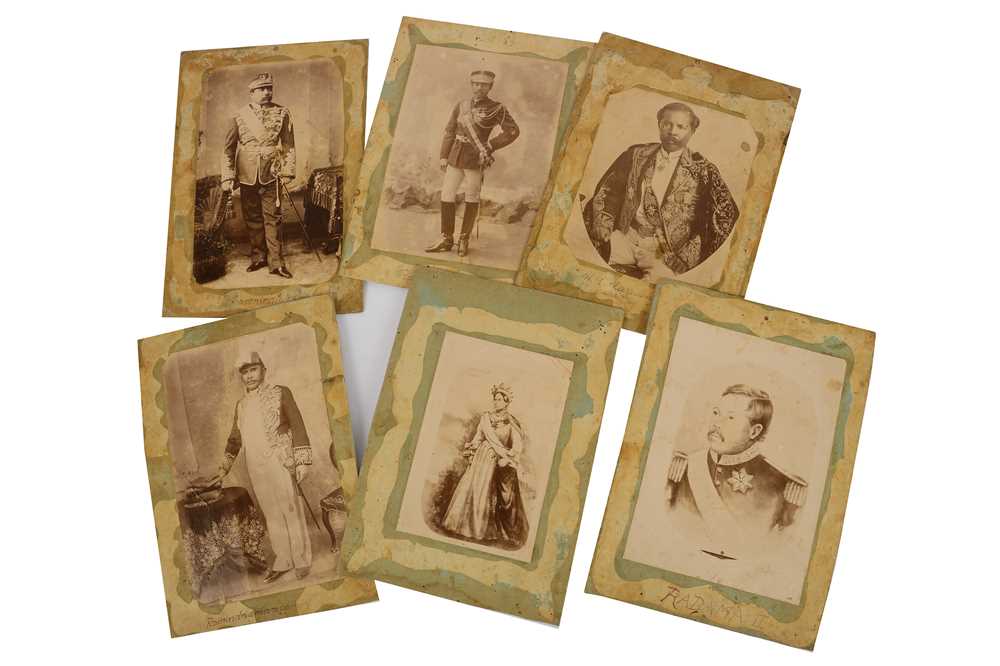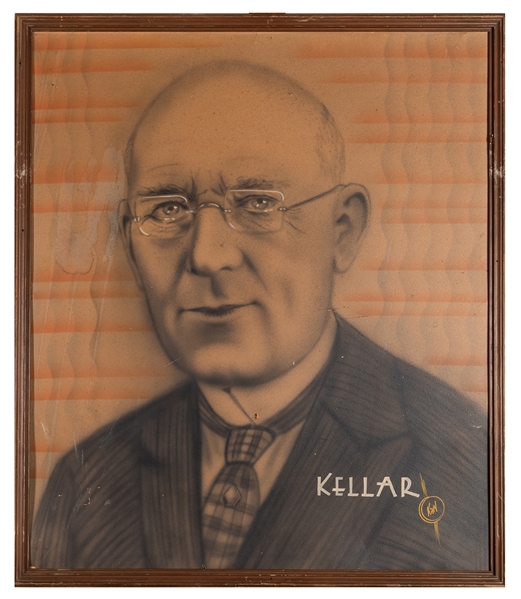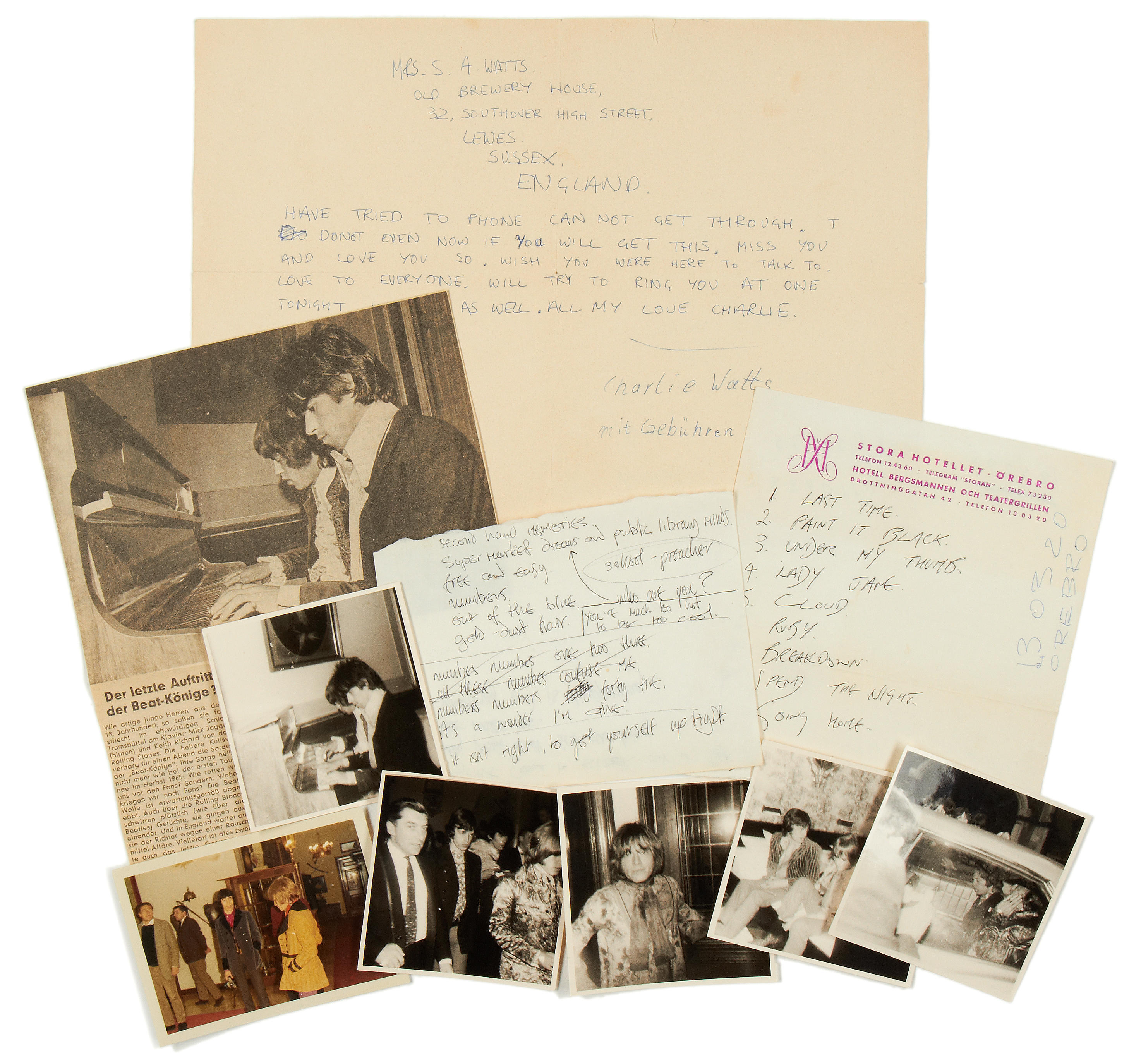Six photographs documenting a visit to Germany by Mufti Haj Muhammad Amin al-Husseini. [Germany, ca. 1943]. The photographs show al-Husseini, accompanied by a number of Nazi senior officials, dressed in uniforms, and a number of government officials, dressed in civilian clothes, during a tour apparently held at a camp in Germany (possibly, a camp of The German Labour Front). A lineup held for the visitors of the camp is seen in some of the photographs. All the photographs are marked on reverse with the stamp "Photo-Gerhards Trebbin". The photographer's mark attests that they were developed in Trebbin, Germany, and may have been shot in its environs. These photographs, previously unknown, document an unidentified visit to Germany by al-Husseini. We were unable to identify the men in the photographs. However, according to some speculations, among the photographed are possibly the Croatian politician Mile Budak (a member of the Ustase Party who served as Croatian envoy to Germany in 1941-1943), Iraqi politician Rashid Ali al-Gaylani, Fritz Grobba (the German ambassador to Iraq, later in charge of Middle Eastern affairs at the German Foreign Ministry, known for his ties to al-Husseini and Rashid Ali al-Gaylani during al-Gaylani's revolt against the Iraqi government and in the following years) and the Austrian politician Arthur Seyss-Inquart. Haj Muhammad Amin al-Husseini (1895?-1974) served as the Mufti of Jerusalem during the British Mandate period, in the years 1921-1937, and was known as one of the most important and influential leaders of the Palestinian Arabs and the Palestinian national movement. Al-Husseini was born in Jerusalem to an eminent and well-established Palestinian-Arab family, many of whose members served in religious and political leadership roles. Al-Husseini studied in Jerusalem, Cairo and Istanbul, and with the outbreak of World War I was drafted to the Ottoman army. After his military service he returned to Jerusalem, where, among other things, he recruited volunteers for the Arab Revolt against the Ottoman Empire (1916-1918). Al-Husseini was a member of a number of Arab organizations and clubs with nationalist leanings. As part of his activities in these organizations, he was among the chief instigators of the 1920 riots, occurring in Jerusalem during the Nabi Musa festival. As a result he gained fame among the Arab public. In the aftermath of the riots, the British authorities issued an arrest warrant against al-Husseini and Aref al-Aref (a journalist who participated in the incitement leading up to the riots), and the two fled to the Transjordan. They were sentenced in absentia to ten years of imprisonment, but in the same year were pardoned by British High Commissioner Herbert Samuel (following appeals by a number of sheikhs and dignitaries from the Transjordan). In 1921 al-Husseini was appointed Mufti of Jerusalem, and later chosen to serve as president of the Supreme Muslim Council. In these roles he acted against Jewish settlement of Palestine and in favor of Palestinian nationalism, contributing, among other things, to the 1929 Riots and the 1936-1939 Arab Revolt (al-Husseini was one of the initiators and organizers of the revolt, and the chairman of the Arab Higher Committee). In 1937, after the British outlawed the Arab Higher Committee and dispersed the Supreme Muslim Council, al-Husseini fled to Lebanon, where he stayed for about two years before moving to Iraq. In Iraq he joined the politician Rashid Ali al-Gaylani and contributed significantly to the planning and organization of the revolt led by al-Gaylani in 1941. Following the revolt, al-Gaylani established a pro-Nazi government that demanded the expulsion of the British from Iraq, but his government did not last for long, and with the collapse of the coup, al-Husseini and al-Gaylani left Iraq. Al-Husseini first traveled to Fascist Italy (where he even met Mussolini), then to Nazi Germany. Al-Gaylani also arrived in Germany. Haj Amin al-Huss
Six photographs documenting a visit to Germany by Mufti Haj Muhammad Amin al-Husseini. [Germany, ca. 1943]. The photographs show al-Husseini, accompanied by a number of Nazi senior officials, dressed in uniforms, and a number of government officials, dressed in civilian clothes, during a tour apparently held at a camp in Germany (possibly, a camp of The German Labour Front). A lineup held for the visitors of the camp is seen in some of the photographs. All the photographs are marked on reverse with the stamp "Photo-Gerhards Trebbin". The photographer's mark attests that they were developed in Trebbin, Germany, and may have been shot in its environs. These photographs, previously unknown, document an unidentified visit to Germany by al-Husseini. We were unable to identify the men in the photographs. However, according to some speculations, among the photographed are possibly the Croatian politician Mile Budak (a member of the Ustase Party who served as Croatian envoy to Germany in 1941-1943), Iraqi politician Rashid Ali al-Gaylani, Fritz Grobba (the German ambassador to Iraq, later in charge of Middle Eastern affairs at the German Foreign Ministry, known for his ties to al-Husseini and Rashid Ali al-Gaylani during al-Gaylani's revolt against the Iraqi government and in the following years) and the Austrian politician Arthur Seyss-Inquart. Haj Muhammad Amin al-Husseini (1895?-1974) served as the Mufti of Jerusalem during the British Mandate period, in the years 1921-1937, and was known as one of the most important and influential leaders of the Palestinian Arabs and the Palestinian national movement. Al-Husseini was born in Jerusalem to an eminent and well-established Palestinian-Arab family, many of whose members served in religious and political leadership roles. Al-Husseini studied in Jerusalem, Cairo and Istanbul, and with the outbreak of World War I was drafted to the Ottoman army. After his military service he returned to Jerusalem, where, among other things, he recruited volunteers for the Arab Revolt against the Ottoman Empire (1916-1918). Al-Husseini was a member of a number of Arab organizations and clubs with nationalist leanings. As part of his activities in these organizations, he was among the chief instigators of the 1920 riots, occurring in Jerusalem during the Nabi Musa festival. As a result he gained fame among the Arab public. In the aftermath of the riots, the British authorities issued an arrest warrant against al-Husseini and Aref al-Aref (a journalist who participated in the incitement leading up to the riots), and the two fled to the Transjordan. They were sentenced in absentia to ten years of imprisonment, but in the same year were pardoned by British High Commissioner Herbert Samuel (following appeals by a number of sheikhs and dignitaries from the Transjordan). In 1921 al-Husseini was appointed Mufti of Jerusalem, and later chosen to serve as president of the Supreme Muslim Council. In these roles he acted against Jewish settlement of Palestine and in favor of Palestinian nationalism, contributing, among other things, to the 1929 Riots and the 1936-1939 Arab Revolt (al-Husseini was one of the initiators and organizers of the revolt, and the chairman of the Arab Higher Committee). In 1937, after the British outlawed the Arab Higher Committee and dispersed the Supreme Muslim Council, al-Husseini fled to Lebanon, where he stayed for about two years before moving to Iraq. In Iraq he joined the politician Rashid Ali al-Gaylani and contributed significantly to the planning and organization of the revolt led by al-Gaylani in 1941. Following the revolt, al-Gaylani established a pro-Nazi government that demanded the expulsion of the British from Iraq, but his government did not last for long, and with the collapse of the coup, al-Husseini and al-Gaylani left Iraq. Al-Husseini first traveled to Fascist Italy (where he even met Mussolini), then to Nazi Germany. Al-Gaylani also arrived in Germany. Haj Amin al-Huss














Testen Sie LotSearch und seine Premium-Features 7 Tage - ohne Kosten!
Lassen Sie sich automatisch über neue Objekte in kommenden Auktionen benachrichtigen.
Suchauftrag anlegen